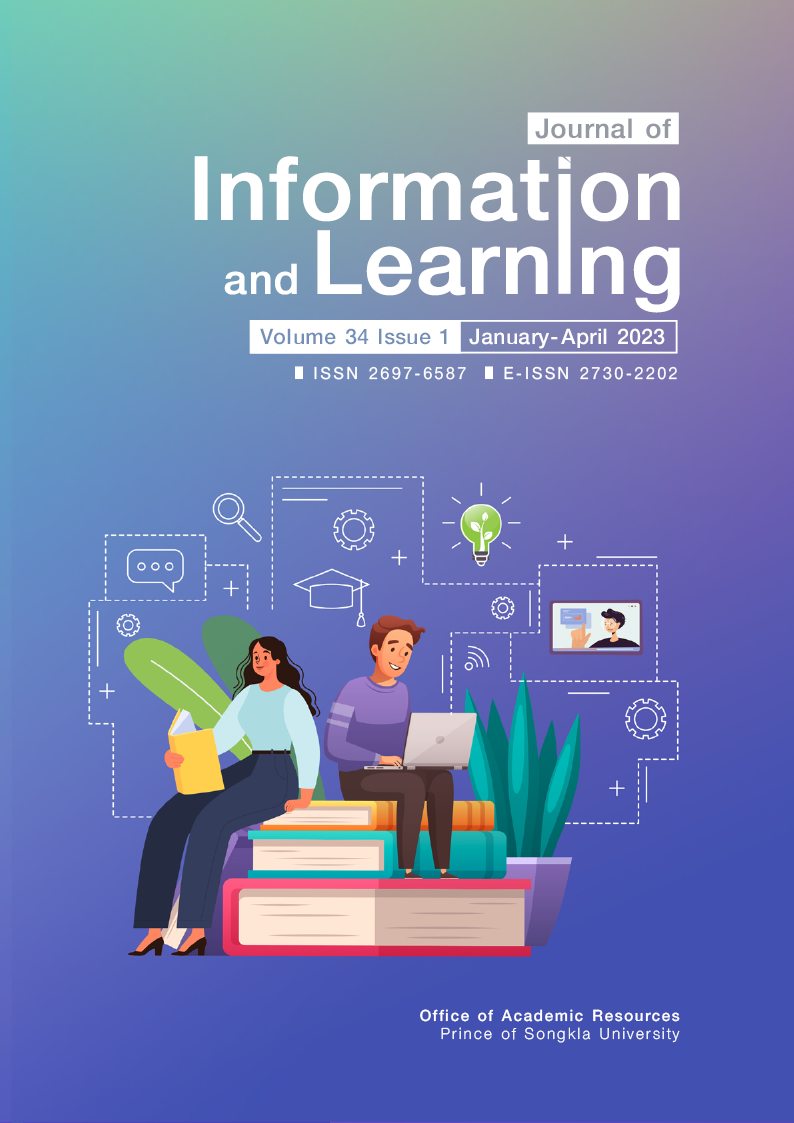Guidelines for Socio-scientific Issue Learning Management to Enhance Climate Change Literacy about Humans and Sustainability of Natural Resources and Environment of 12th Grade Students
Main Article Content
Abstract
The purposes of this action research were 1) to study guidelines in learning management with socio-scientific issues enhancing climate change literacy about humans and sustainability of natural resources and environment of 12th grade students, and 2) to study the 12th grade students' climate change literacy engaged with socio-scientific issues learning menagement. The participants were 30 students in 12th grade of a secondary school, chosen by purposive random technique, in Hunkha District, Chainat Province. The research tools consisted of three lesson plans about humans and sustainability of natural resources and environment, teaching reflection with teacher and peer observation form, learning sheets and students' climate change literacy assessment form. The information analyses were undertaken by triangulation analysis through mean and percentage.
The study revealed that learning management with socio-scientific issues enhancing climate change literacy about humans and sustainability of natural resources and environment consisted of five stages. First, problem analysis was driven by selecting issues and prioritising analytic questions about natural resource problems affecting climate changes. Second, data collection was organized by column 'Padlet' application working as an analytic questions about natural resource problems affecting climate change prioritiser and a data receiver. Third, understanding scio-scientific issues and relations of social problems concerned students' information-related discussions to raise awareness on climate changes. Fourth, role-playing was managed by public conference to present students' solutions as being stakeholders concerning with climate changes. Finally, thinking reflection dealt with students' opinion exchange in order to seek for solutions to SSI issues regarding climate changes in classroom context and report of climate changes. Additionally, climate change literacy while teaching was correlated with the results of post-teaching assessments. The average score of students on the worksheet for in-class activities increased from 54.81% at the level of having interest in climate change to 81.44% at the level of behavioral performance. This was correlated with the mean of the final assessment at 80.10 % at the level of behavioral performance.
Article Details

This work is licensed under a Creative Commons Attribution-NonCommercial-NoDerivatives 4.0 International License.
The Journal of Information and Learning is operated by the Office of Academic Resources, Prince of Songkla University. All articles published in the journal are protected by Thailand copyright law. This copyright covers the exclusive rights to share, reproduce and distribute the article, including in electronic forms, reprints, translations, photographic reproductions, or similar. Authors own copyrights in the works they have created as well as the Office of Academic Resources. The Journal reserves the right to edit the language of papers accepted for publication for clarity and correctness, as well as to make formal changes to ensure compliance with the journal's guidelines. All authors must take public responsibility for the content of their paper.
References
Athman, E. J., & Monroe, M. (2004). The effect of environmental-based education on students' critical thinking skills and disposition toward critical thinking. Environmental Education Research, 10(4), 507-522.
Dalelo, K. (2011). Climate change literacy among postgraduate students of Addis Ababa University, Ethiopia. Southern African Journal of Environmental Education, 28, 85-104. https://www.ajol.info/index.php/sajee/article/view/122245
Eilks, I. (2010). Making chemistry teaching relevant and promoting scientific literacy by focusing on authentic and controversial socio-scientific issues. International Journal of Science Education, 44(1), 163-184.
Kitkư̄akūn, S. (2014). Kānčhatkān rīanrū witthayāsāt: thitthāng samrap khrū satawat thī 21 [Learning management science, Direction for teachers in the 21st century]. Junladiskanpim publisher.
Kemmis, S. and McTaggart, R. (Eds.). (1988). The action research planner (3rd ed.). Deakin University Press.
Kollmuss, A. (2002). Mind the gap: Why do people act environmentally and what are the barriers to pro-environmental behavior. Environmental Education Research, 8(3), 239-260. https://doi.org/10.1080/13504620220145401
Lee, Y. C., & Grace, M. (2012). Students’ reasoning and decision making about a socio-scientific issue: A cross-context comparison. Science Education, 96(5), 787-807.
Manōsō̜n, S. (2019). Development of Climate Literacy for lower secondary school students using inquiry instruction and games [Master’s thesis, Chulalongkorn University]. CUIR. http://cuir.car.chula.ac.th/handle/123456789/64768
Marzetta, K. L. (2016). Changing the climate of beliefs: A conceptual model of learning design elements to promote climate change literacy. Journal of Sustainability Education, 16, 1-18.
Miléř, T., & Sládek, P. (2011). The climate literacy challenge. Procedia Social and Behavioral Sciences, 12, 150-156. https://www.sciencedirect.com/science/article/pii/S187704281100111X
Ministry of Natural Resources and Environment. (2018). Thailand’s National Adaptation Plan. Office of Natural Resources and Environmental Policy and Planning.
Niepold, F., Herring, D., & McConville, D. (2007, June 5). The case for climate literacy in the 21st Century [Paper presentation]. The 5th International Symposium on Digital Earth., China. https://rose.geog.mcgill.ca/geoide/files/geoide/CaseForClimateLiteracy.pdf
Phanyōsī, P. (2015). Effect of socio-scientific issues based learning on environmental literacy of lower secondary school students [Master’s thesis, Chulalongkorn University]. CUIR. http://cuir.car.chula.ac.th/handle/123456789/51304
Sadler, T. D. (2011). Socio-scientific issues in the classroom: Teaching, learning and research, contemporary trends and issues in science education (39th ed). Gainesville.
Sīsuphotčhanānon, S. (2017). Development analytical thinking skill for industrial program and inventory systems of undergraduates by teaching on Padlet. Vocational Education Innovation and Research Journal, 1(2), 1-6. https://so06.tci-thaijo.org/index.php/ve-irj/article/view/195763/136055
U.S. Global Change Research Program. (2009, July 20). Climate literacy: The essential principles of climate science: a guide for individuals and communities. GlobalChange.gov. https://www.globalchange.gov/about
Wanwisēt, W. (2015). Kān plīanplǣng saphāp phūmiʻākāt: Phonkrathop tō̜ prathētthai [Climate change: Impact on Thailand]. The Secretariat of the Senate, 5(17), 1-25.
Zeidler, D. L. (2011). Global sustainability and public understanding of science: The role of socio-scientific issues in the international community. Asia-Pacific Forum on Science Learning and Teaching, 12(1). 1-9.
Zeidler, D. L., & Keefer, M. (2003). The role of moral reasoning and the status of Socio-scientific issues in science education. Kluwer Academic.
Zeidler, D. L., Sadler, T. D., Simmons, M. L., & Howes, E. V. (2005). Beyond STS: A research-based framework for Socio-Scientific issues education. Science Education, 89, 357-377.
Zeidler, D., Sadler, T., Applebaum, S., & Callahan, B. (2009). Advancing reflective judgment through Socio-scientific Issues. Journal of Research in Science Teaching, 46(1), 74 -101.


